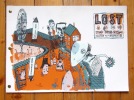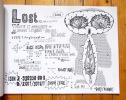Bureau Sylvain:
Lost.
Chez l'auteur / Violette et Marguerite, 2001. In-folio à l'italienne broché sur agrafes parisiennes, format 42 x 29 cm.
Reference : 2530
La couverture est en sérigraphie 4 passages. Tirage limité 150 exemplaires non numérotés. Introuvable (sauf ici).
Bookseller's contact details
La Bergerie
Mme Aline Berger
Payment mode
Sale conditions
Paiement par virement bancaire en francs suisses ou en euros (sans frais). Les paiements par PayPal ne sont plus acceptés, suite à un différend qui nous a décidés à nous passer de leurs services. Les livres sont expédiés dans les jours suivant la réception du montant demandé.
5 book(s) with the same title
PARADISE LOST (PARADIS PERDU)
1850 demi-reliure contemporaine en skivertex grenat grand in-octavo, dos long - titre frappé or, tranches lisses, 1 petite illustration sur la page de titre, légères rousseurs, 382 pages, 1850 à Paris Baudry's European Library,
ouvrage d'expression anglaise - with copious notes explanatory and critical, and partly original also "a memoir of his life" by James Prendeville - bon état général
A methode unto mortification: called heretofore, the contempt of the world, and the vanitie thereof Written at the first in the Spanish. - [A SOURCE FOR SHAKESPEARE'S ""LOVE'S LABOUR'S LOST""]
London, Iohn Windet, 1608. 12mo. In contemporary full calf. Small paper-label pasted on to top of spine. Wear to extremities, corners bumped. Edges of boards with loss of leather. Previous owner's names to front and back end paper (""Robert Wilson"" & ""Edvard Wilson, anno domini 1666""). Internally with a few light dampstains. (20), 328, 328-499, (4) pp.
The exceedingly rare second edition (the first being from 1586) of Rogers’ somewhat free translation of ‘Papist’ Diego de Estalla’s work “Libro de la vanidad del mundo (Toledo, 1562). Rogers admits that he had no access to the original but had to use the Italian and Spanish translations. The present English translation, however, is of significant interest, as recent research suggests it was a source and inspiration for Shakespeare’s ‘Love’s Labour’s Lost’: At the opening of ‘Love’s Labour’s Lost’, the vow to renounce worldly pleasure has barely been announced before one of Navarre’s book-men declares his success: “Dumaine is mortified” (I.i.28). This ‘mortified’ is not a word Shakespeare would use often. It appears here in the sense of ‘having the appetites and passions in subjection’ and insensible or impervious to (the world and its pleasures), the latter informing Dumaine’s gloss: ‘To love, to wealth, to pomp. I pine and die’. The fact that this is the earliest use of ‘mortified’ in the Shakespearean canon is the first clue that one of the sources for Love’s Labour’s Lost was Thomas Roger’s A Methode unto Mortification, published in London in 1586 and again in 1608. Shakespeare’s pleasure in frustrating the ambitions of this book went some way to shaping his play”. (Kingsley-Smith, A Method unto Mortification: A New Source for Love’s Labour’s Lost). ""Love's Labour's Lost"" is one of William Shakespeare's early comedies, believed to have been written in the mid-1590s. The play revolves around the King of Navarre and three of his noble companions who make a pact to swear off women and focus on scholarly pursuits for three years. However, their resolve is tested when the Princess of France and her entourage arrive on a diplomatic mission. Each of the men falls in love with one of the women, leading to a series of comedic misunderstandings, romantic entanglements, and wordplay. “It is also possible that some facts about the original author sparked Shakespeare’s interest. Diego de Estella was born in Navarre, and spent time the court of Philip II of Spain before incurring disapproval for his criticism of court life and being forced into a Franciscan monastery. Armado, the braggart and clown of Love’s Labour’s Lost, is the first Spaniard to appear in Shakespeare”. (Kingsley-Smith, A Method unto Mortification: A New Source for Love’s Labour’s Lost).
Reference : albad4a48ac7e2b5ddf
Summary Catalogue of the cultural valuables stolen and lost during World War II
Summary Catalogue of the cultural valuables stolen and lost during World War II. Volume 11. Lost book treasures. Book 2. Leningrad region. Gatchina / / / Consolidated Catalogue of Cultural Property Stolen and Lost during World War II, Vol. 11. Pot In English /Summary Catalogue of the cultural valuables stolen and lost during World War II. Volume 11. Lost book treasures. Book 2. Leningrad region. Gatchina/// Svodnyy katalog kulturnykh tsennostey, pokhishchennykh i uteryannykh vo vremya Vtoroy mirovoy voyny, Tom 11. Pote In English. M-SPb Ministry of Culture of the Russian Federation. 2003. 112 p. We have thousands of titles and often several copies of each title may be available. Please feel free to contact us for a detailed description of the copies available. SKUalbad4a48ac7e2b5ddf.
Reference : alb3729fcf0e3f61d6e
Frank Joseph Frank Joseph. The Lost Civilization of Lemuria: The Lost Civilizat
Frank Joseph Frank Joseph. The Lost Civilization of Lemuria: The Lost Civilization of Lemuria: The Rise and Fall of the Worlds Ancient Culture. In Russian /Frank Joseph Frenk Dzhozef. The Lost Civilization ofLemuria: Poteryannaya tsivilizatsiya Lemurii: Rastsvet i padenie drevneyshey kultury v mire. The Rise and Fall of the Worlds Oldest Culture. US Bear Company 2006. 344c. We have thousands of titles and often several copies of each title may be available. Please feel free to contact us for a detailed description of the copies available. SKUalb3729fcf0e3f61d6e.
Reference : alb53bb414bb9a10c15
Milton J. Paradise Lost and Paradise Returned. Paradise Lost and Paradise Regain
Milton J. Paradise Lost and Paradise Returned. Paradise Lost and Paradise Regained In Russian (ask us if in doubt)/Mil'ton Dzh. Poteryannyy ray i vozvrashchennyy ray. Paradise lost and Paradise regained Short description: In Russian (ask us if in doubt).John Milton (1608-1674) was one of England's greatest poets and publicists occupying a special place on the map of world literature - his name is still inextricably linked to English history in the seventeenth century. John Milton's poems have been and still are a table book for many readers around the world. We have thousands of titles and often several copies of each title may be available. Please feel free to contact us for a detailed description of the copies available. SKUalb53bb414bb9a10c15
 Write to the booksellers
Write to the booksellers




